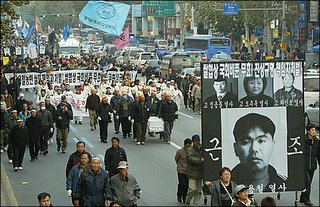
An
article in the Korea Times yesterday made the first mention in the English language media of a death at the hands of riot police which occurred last week:
About 4,000 farmers gathered in Taehangno, central Seoul, to protest National Assembly’s ratification of a rice market opening deal.
The protesters urged the government to punish the police officers responsible for the death of a farmer, Chun Yong-chul who was severely beaten by riot police during a mass protest in front of the National Assembly building on Nov. 15.
The farmers' protest at the
National Assembly on November 15 was the large one against the opening of the rice market which took place just before the APEC summit, which Kotaji covered
here. As he mentioned, some of the farmers were seriously injured, and on November 24, the aforementioned farmer, Chun Yong-chul, died from a cerebral hemorrhage. An
article by the Asian Human Rights Commission gives a more detailed account of the protest and Chun's death:
Mr Jeon was reportedly beaten on the back of his head, right eye and chest by riot police attached to the Seoul Metropolitan Police Agency during their crackdown at about 7pm. Although his external wounds did not seem serious and he left the rally with other protesters without obtaining any medical assistance, on his way home he was overheard speaking to two witnesses, saying that his head was very painful after being hit by a police shield.
On November 17, Mr Jeon was taken to the Boryeong Asan hospital as he was unable to control his body movements. He was then transferred to the Chungnam National University Hospital, where he was hospitalized and treated for a cerebral hemorrhage. He underwent brain surgery twice but died at around 6:30am on November 24.
An autopsy pointed to a skull fracture as the cause of the hemorrhage, but did not say how the fracture occurred. The police maintain the fracture occurred when he fell down at home.
Ohmynews has
several articles which are accompanied by photos and links to many videos (of the Nov. 15 protest, and of the response to his death). Many more photos can be found
here and
here. Obvious in the video of the Nov. 15 protest is the number of the riot squad, 1001, which is well known as a particularly brutal squad;
one photo of this squad at Thursday's protest shows that they have no numbers on their shields. Whether this has anything to do with the anger that has been directed at the police since Chun's death, I don't know. On Nov 28, after several days of mourning, at which several
members of the Democratic Labour Party were to be found, a
protest took place at the Seoul Metropolitan Police station.
The aforementioned protest at Daehangno on Dec. 1 was in fact the starting point for a march down Jongno to Gwanghwamun, where the marchers were greeted by this:

One has to wonder how long it takes the police to park all of those buses; I don't think I've ever seen the front line buttressed like this before. If I remember correctly, the plan was to march to the Blue House, but with such creative parking and the use of
firehoses and masses of riot police, that wasn't very likely. Video of the protest can be found
here and
here, and a lengthy article on the protest with many photos can be found
here (though it's in reverse chronological order).
The photo at the top of this post has photos of three other farmers above the large photo of Chun Yong-chul. They are of Chung Yong-pum, a 38-year-old farmer from Damyang County in South Jeolla Province, who
committed suicide by drinking herbicide on Nov. 11; O Chu Ok, 41, director for cultural affairs of the Women Farmers' Association in Songju County, North Kyongsang Province, who committed suicide on Nov. 17; and Ha Shin-ho, 73, who attended the protest at Yoido on Nov 15 and collapsed and died suddenly on his way home.
Of interest may be an
article (in Korean) comparing the deaths of Kang Kyung-dae (beaten to death by riot police at a protest at Yonsei University in 1991) and Chun Yong-chul.
Updates:
Dec. 16: The police
finally admit the possibility that Jeon Yong Cheol died as the result of being hit by riot police at a farmers' protest.
Dec. 18: Hong Deok-pyo, a farmer injured during the November 15 Yeouido protest,
dies of his injuries.
Dec. 26: The National Human Rights Commission concludes that Jeon Yong-cheol and Hong Deok-pyo died from injuries inflicted by riot police during the Nov. 15 rally.
Dec. 27:
President Roh apologizes on television for the actions of the police, but also criticizes the violent actions of the protesters. Police Chief Huh Joon-young also apologizes, but refuses to voluntarily step down.
Dec. 28: Police Chief Huh is
pressed to resign by members of Uri party and the DLP.
Dec. 29: Despite saying he would not,
Police Chief Huh resigns, saying he did not want to "burden the administration".
Jan. 8:
Families of riot police
hold a protest against violent protests.
January 15: A plan to have riot police
wear name tags while on duty is announced by the National Police Agency. It draws a great deal of criticism before being withdrawn.
Jan. 19: A government panel is formed to
promote peaceful rallies, saying a policy package is due in April.
Feb 12: A
protest in Pyeongtaek against the relocation of US bases there is
celebrated for being non-violent.









